Comprehensive Report: Management and Operations at Next Plc
VerifiedAdded on 2021/02/21
|10
|2932
|29
Report
AI Summary
This report provides a comprehensive analysis of management and operations at Next Plc, a prominent British retail company. It begins with an introduction to Next Plc, its history, and its product lines. The report then defines and compares the roles and characteristics of leaders and managers, highlighting their differences in motivating employees, developing strategies, and directing activities. The analysis further explores the roles of leaders and the functions of managers in different situational contexts, such as rising conflicts and decreasing employee performance, emphasizing the importance of effective communication, decision-making, and delegation. The report also evaluates various leadership theories and models, including situational leadership, system leadership, and contingency leadership, providing insights into how these frameworks can be applied to improve organizational productivity and employee performance. The study concludes by examining the value of operations management in achieving business objectives and addressing challenges within the organization.
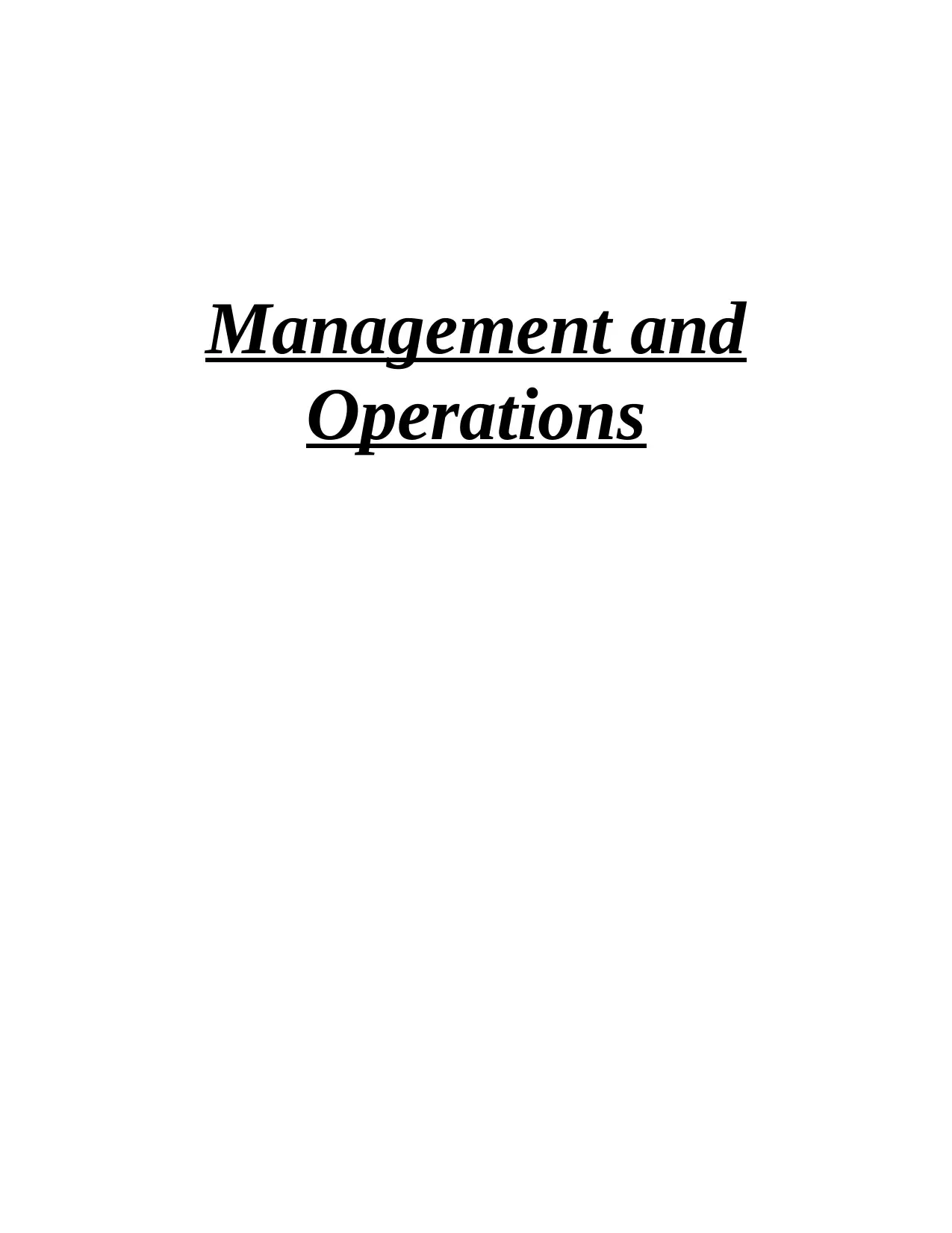
Management and
Operations
Operations
Paraphrase This Document
Need a fresh take? Get an instant paraphrase of this document with our AI Paraphraser
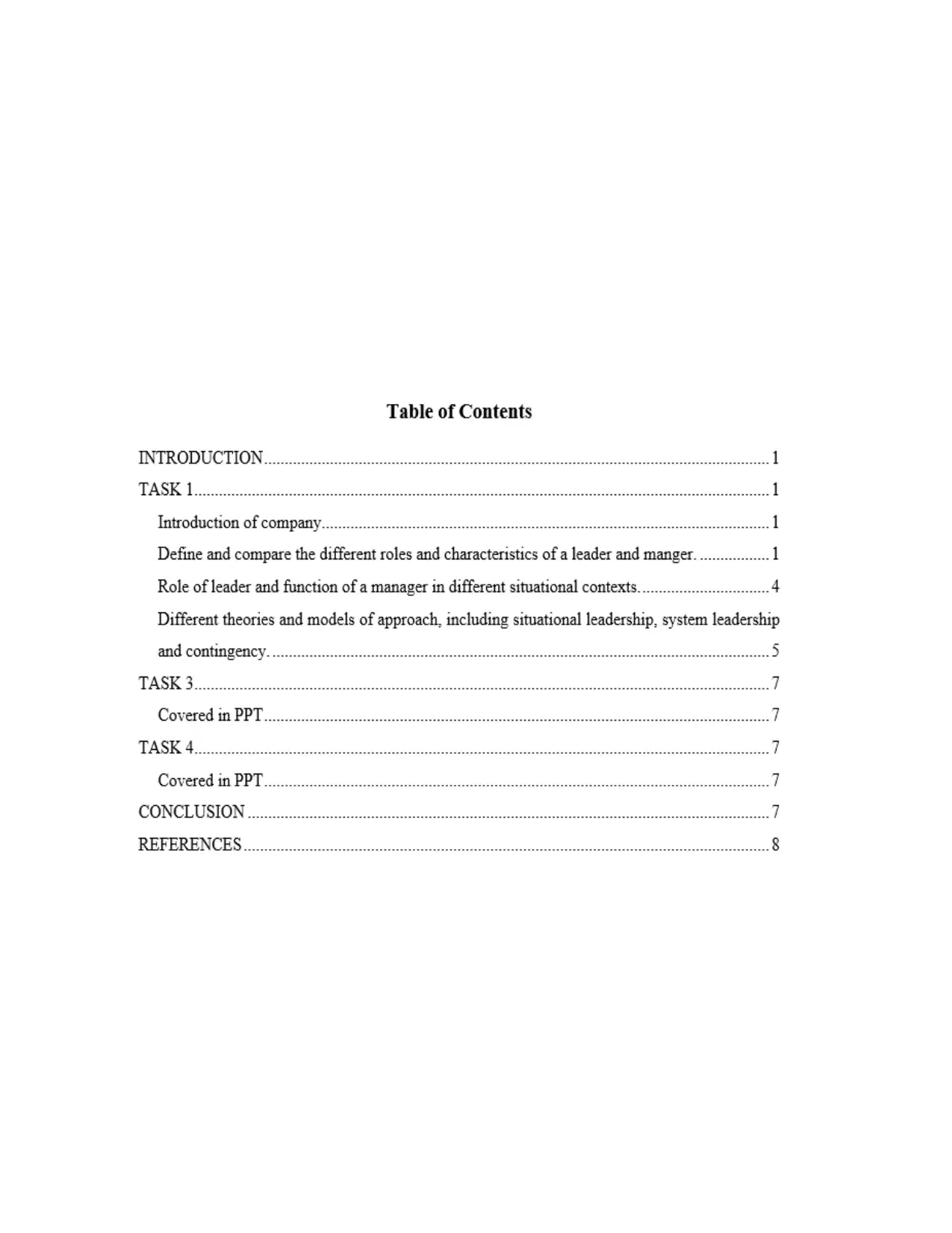
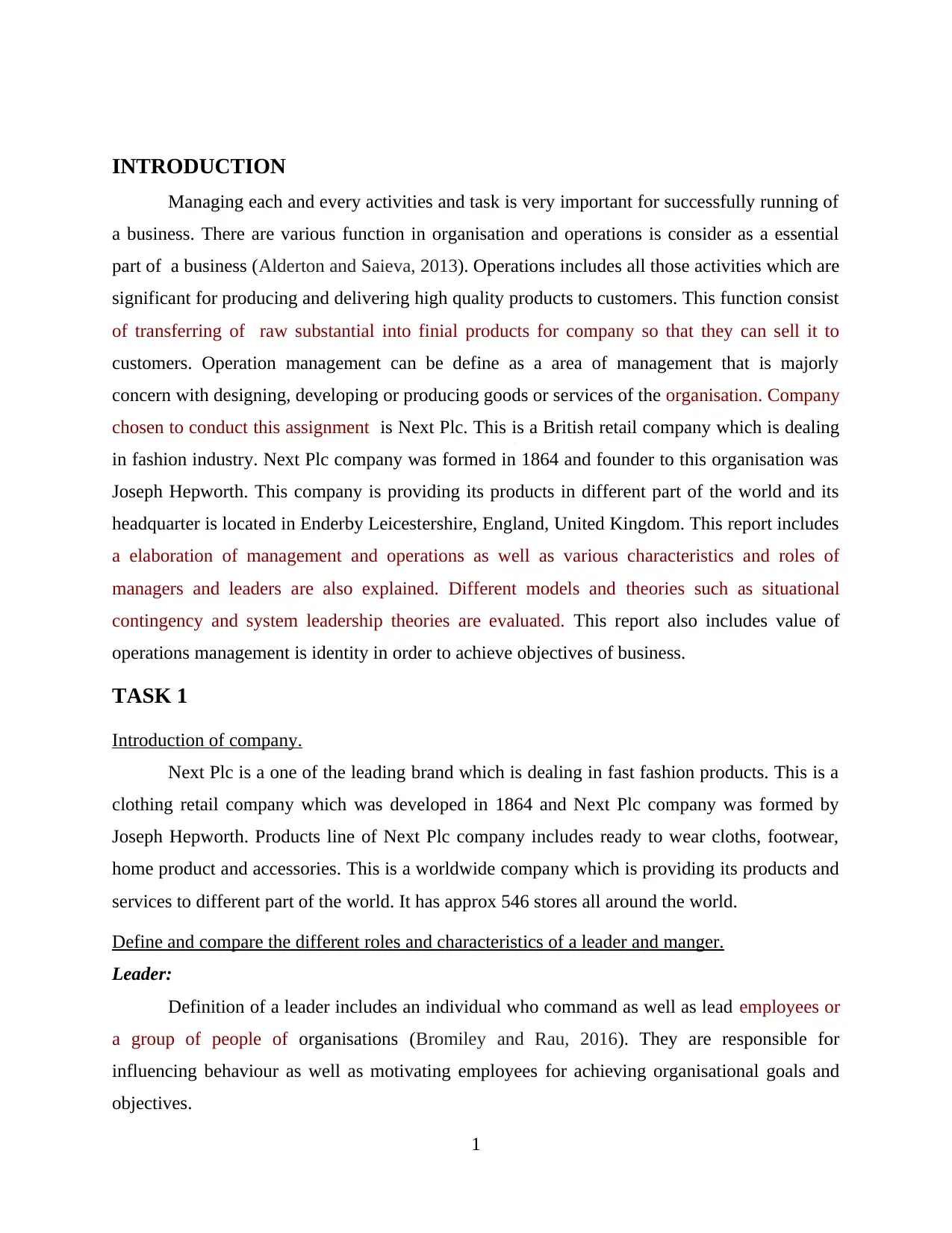
INTRODUCTION
Managing each and every activities and task is very important for successfully running of
a business. There are various function in organisation and operations is consider as a essential
part of a business (Alderton and Saieva, 2013). Operations includes all those activities which are
significant for producing and delivering high quality products to customers. This function consist
of transferring of raw substantial into finial products for company so that they can sell it to
customers. Operation management can be define as a area of management that is majorly
concern with designing, developing or producing goods or services of the organisation. Company
chosen to conduct this assignment is Next Plc. This is a British retail company which is dealing
in fashion industry. Next Plc company was formed in 1864 and founder to this organisation was
Joseph Hepworth. This company is providing its products in different part of the world and its
headquarter is located in Enderby Leicestershire, England, United Kingdom. This report includes
a elaboration of management and operations as well as various characteristics and roles of
managers and leaders are also explained. Different models and theories such as situational
contingency and system leadership theories are evaluated. This report also includes value of
operations management is identity in order to achieve objectives of business.
TASK 1
Introduction of company.
Next Plc is a one of the leading brand which is dealing in fast fashion products. This is a
clothing retail company which was developed in 1864 and Next Plc company was formed by
Joseph Hepworth. Products line of Next Plc company includes ready to wear cloths, footwear,
home product and accessories. This is a worldwide company which is providing its products and
services to different part of the world. It has approx 546 stores all around the world.
Define and compare the different roles and characteristics of a leader and manger.
Leader:
Definition of a leader includes an individual who command as well as lead employees or
a group of people of organisations (Bromiley and Rau, 2016). They are responsible for
influencing behaviour as well as motivating employees for achieving organisational goals and
objectives.
1
Managing each and every activities and task is very important for successfully running of
a business. There are various function in organisation and operations is consider as a essential
part of a business (Alderton and Saieva, 2013). Operations includes all those activities which are
significant for producing and delivering high quality products to customers. This function consist
of transferring of raw substantial into finial products for company so that they can sell it to
customers. Operation management can be define as a area of management that is majorly
concern with designing, developing or producing goods or services of the organisation. Company
chosen to conduct this assignment is Next Plc. This is a British retail company which is dealing
in fashion industry. Next Plc company was formed in 1864 and founder to this organisation was
Joseph Hepworth. This company is providing its products in different part of the world and its
headquarter is located in Enderby Leicestershire, England, United Kingdom. This report includes
a elaboration of management and operations as well as various characteristics and roles of
managers and leaders are also explained. Different models and theories such as situational
contingency and system leadership theories are evaluated. This report also includes value of
operations management is identity in order to achieve objectives of business.
TASK 1
Introduction of company.
Next Plc is a one of the leading brand which is dealing in fast fashion products. This is a
clothing retail company which was developed in 1864 and Next Plc company was formed by
Joseph Hepworth. Products line of Next Plc company includes ready to wear cloths, footwear,
home product and accessories. This is a worldwide company which is providing its products and
services to different part of the world. It has approx 546 stores all around the world.
Define and compare the different roles and characteristics of a leader and manger.
Leader:
Definition of a leader includes an individual who command as well as lead employees or
a group of people of organisations (Bromiley and Rau, 2016). They are responsible for
influencing behaviour as well as motivating employees for achieving organisational goals and
objectives.
1
⊘ This is a preview!⊘
Do you want full access?
Subscribe today to unlock all pages.

Trusted by 1+ million students worldwide
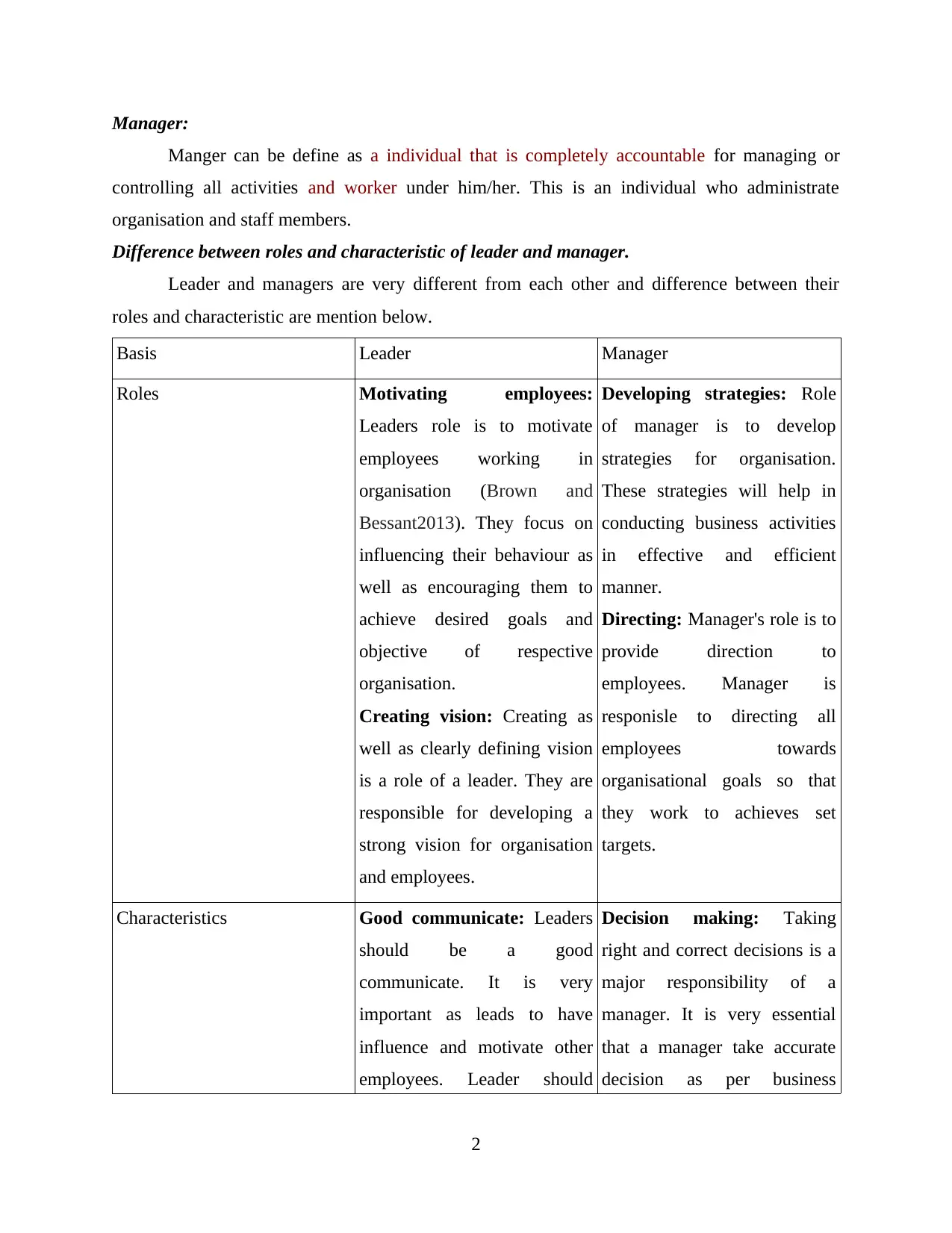
Manager:
Manger can be define as a individual that is completely accountable for managing or
controlling all activities and worker under him/her. This is an individual who administrate
organisation and staff members.
Difference between roles and characteristic of leader and manager.
Leader and managers are very different from each other and difference between their
roles and characteristic are mention below.
Basis Leader Manager
Roles Motivating employees:
Leaders role is to motivate
employees working in
organisation (Brown and
Bessant2013). They focus on
influencing their behaviour as
well as encouraging them to
achieve desired goals and
objective of respective
organisation.
Creating vision: Creating as
well as clearly defining vision
is a role of a leader. They are
responsible for developing a
strong vision for organisation
and employees.
Developing strategies: Role
of manager is to develop
strategies for organisation.
These strategies will help in
conducting business activities
in effective and efficient
manner.
Directing: Manager's role is to
provide direction to
employees. Manager is
responisle to directing all
employees towards
organisational goals so that
they work to achieves set
targets.
Characteristics Good communicate: Leaders
should be a good
communicate. It is very
important as leads to have
influence and motivate other
employees. Leader should
Decision making: Taking
right and correct decisions is a
major responsibility of a
manager. It is very essential
that a manager take accurate
decision as per business
2
Manger can be define as a individual that is completely accountable for managing or
controlling all activities and worker under him/her. This is an individual who administrate
organisation and staff members.
Difference between roles and characteristic of leader and manager.
Leader and managers are very different from each other and difference between their
roles and characteristic are mention below.
Basis Leader Manager
Roles Motivating employees:
Leaders role is to motivate
employees working in
organisation (Brown and
Bessant2013). They focus on
influencing their behaviour as
well as encouraging them to
achieve desired goals and
objective of respective
organisation.
Creating vision: Creating as
well as clearly defining vision
is a role of a leader. They are
responsible for developing a
strong vision for organisation
and employees.
Developing strategies: Role
of manager is to develop
strategies for organisation.
These strategies will help in
conducting business activities
in effective and efficient
manner.
Directing: Manager's role is to
provide direction to
employees. Manager is
responisle to directing all
employees towards
organisational goals so that
they work to achieves set
targets.
Characteristics Good communicate: Leaders
should be a good
communicate. It is very
important as leads to have
influence and motivate other
employees. Leader should
Decision making: Taking
right and correct decisions is a
major responsibility of a
manager. It is very essential
that a manager take accurate
decision as per business
2
Paraphrase This Document
Need a fresh take? Get an instant paraphrase of this document with our AI Paraphraser
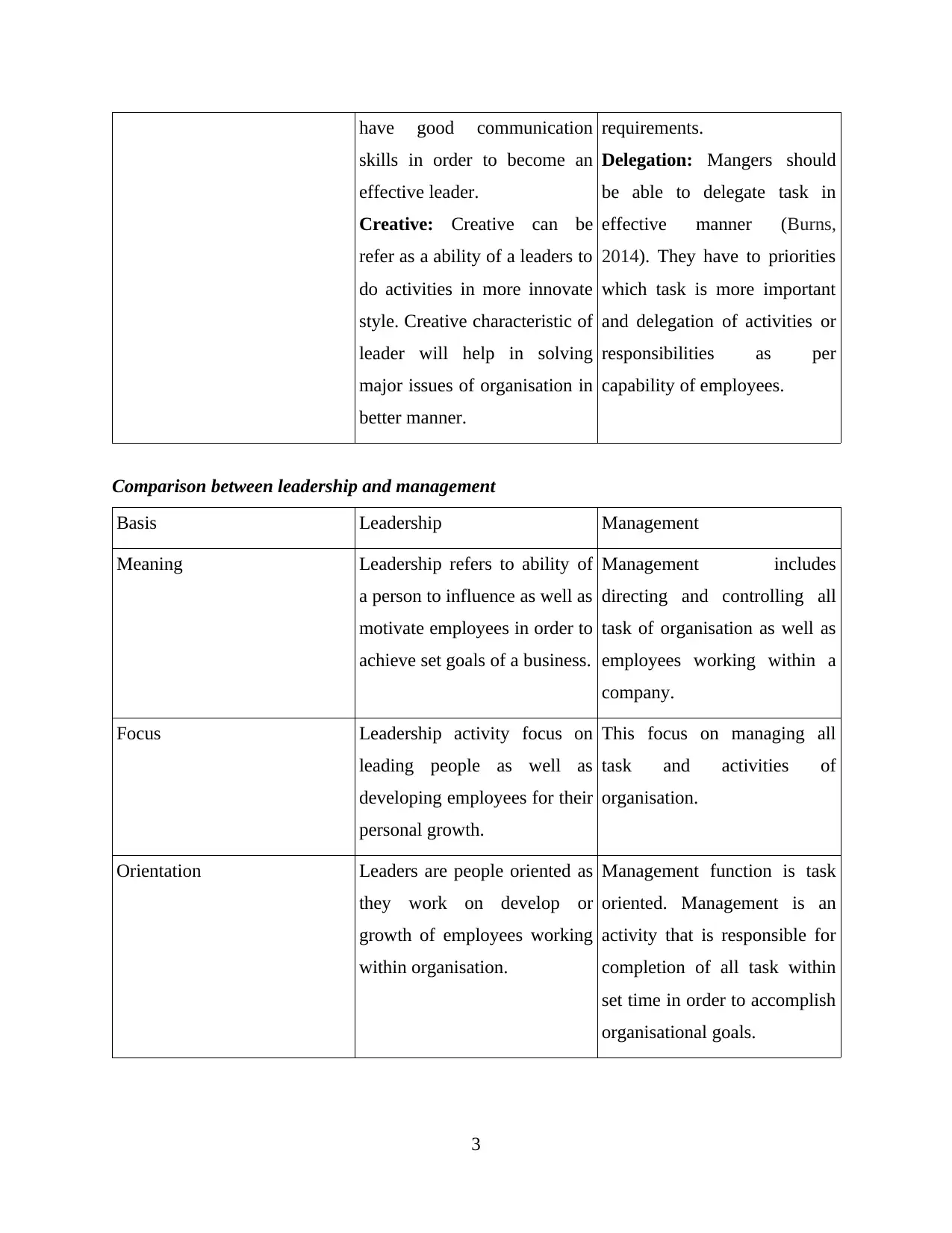
have good communication
skills in order to become an
effective leader.
Creative: Creative can be
refer as a ability of a leaders to
do activities in more innovate
style. Creative characteristic of
leader will help in solving
major issues of organisation in
better manner.
requirements.
Delegation: Mangers should
be able to delegate task in
effective manner (Burns,
2014). They have to priorities
which task is more important
and delegation of activities or
responsibilities as per
capability of employees.
Comparison between leadership and management
Basis Leadership Management
Meaning Leadership refers to ability of
a person to influence as well as
motivate employees in order to
achieve set goals of a business.
Management includes
directing and controlling all
task of organisation as well as
employees working within a
company.
Focus Leadership activity focus on
leading people as well as
developing employees for their
personal growth.
This focus on managing all
task and activities of
organisation.
Orientation Leaders are people oriented as
they work on develop or
growth of employees working
within organisation.
Management function is task
oriented. Management is an
activity that is responsible for
completion of all task within
set time in order to accomplish
organisational goals.
3
skills in order to become an
effective leader.
Creative: Creative can be
refer as a ability of a leaders to
do activities in more innovate
style. Creative characteristic of
leader will help in solving
major issues of organisation in
better manner.
requirements.
Delegation: Mangers should
be able to delegate task in
effective manner (Burns,
2014). They have to priorities
which task is more important
and delegation of activities or
responsibilities as per
capability of employees.
Comparison between leadership and management
Basis Leadership Management
Meaning Leadership refers to ability of
a person to influence as well as
motivate employees in order to
achieve set goals of a business.
Management includes
directing and controlling all
task of organisation as well as
employees working within a
company.
Focus Leadership activity focus on
leading people as well as
developing employees for their
personal growth.
This focus on managing all
task and activities of
organisation.
Orientation Leaders are people oriented as
they work on develop or
growth of employees working
within organisation.
Management function is task
oriented. Management is an
activity that is responsible for
completion of all task within
set time in order to accomplish
organisational goals.
3
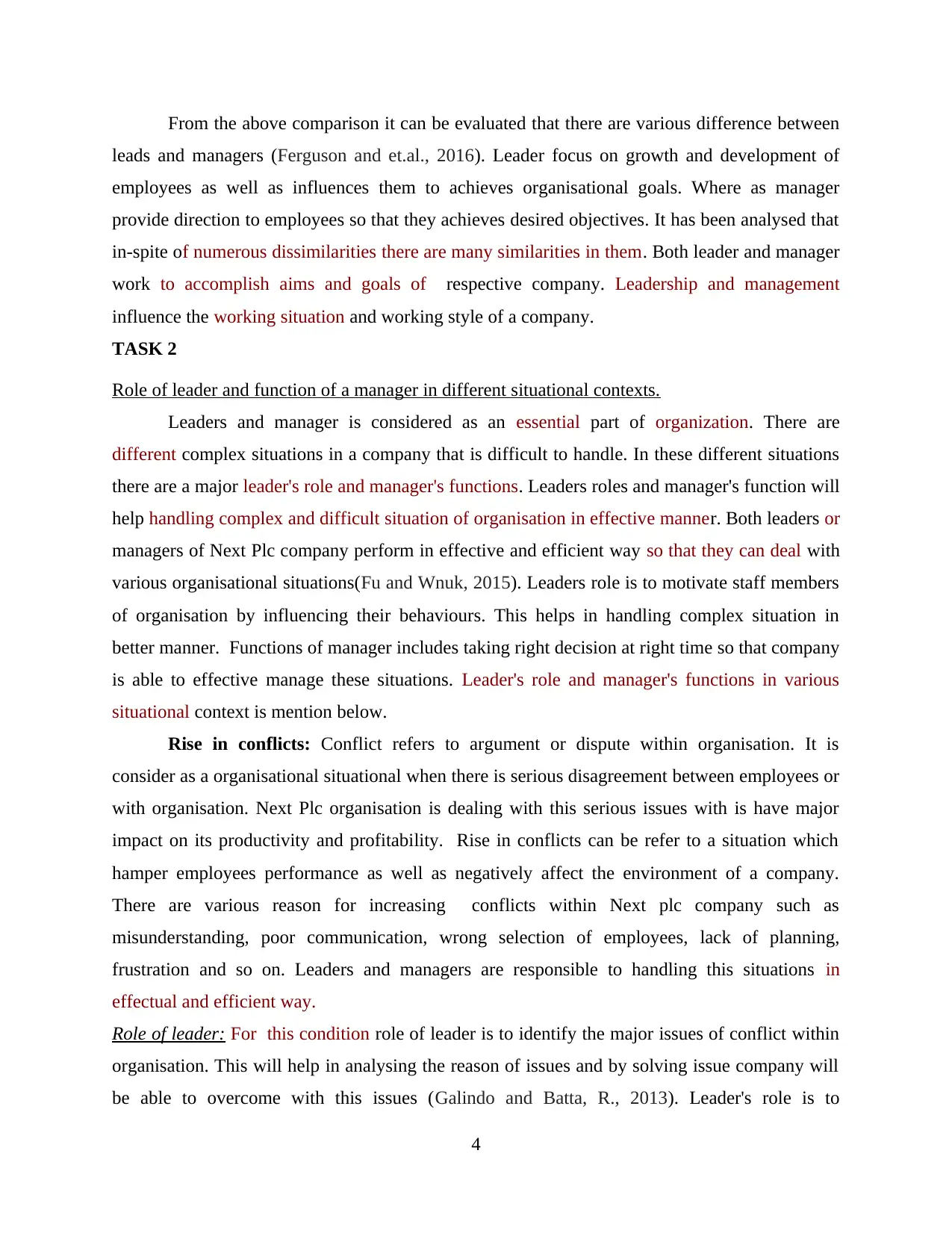
From the above comparison it can be evaluated that there are various difference between
leads and managers (Ferguson and et.al., 2016). Leader focus on growth and development of
employees as well as influences them to achieves organisational goals. Where as manager
provide direction to employees so that they achieves desired objectives. It has been analysed that
in-spite of numerous dissimilarities there are many similarities in them. Both leader and manager
work to accomplish aims and goals of respective company. Leadership and management
influence the working situation and working style of a company.
TASK 2
Role of leader and function of a manager in different situational contexts.
Leaders and manager is considered as an essential part of organization. There are
different complex situations in a company that is difficult to handle. In these different situations
there are a major leader's role and manager's functions. Leaders roles and manager's function will
help handling complex and difficult situation of organisation in effective manner. Both leaders or
managers of Next Plc company perform in effective and efficient way so that they can deal with
various organisational situations(Fu and Wnuk, 2015). Leaders role is to motivate staff members
of organisation by influencing their behaviours. This helps in handling complex situation in
better manner. Functions of manager includes taking right decision at right time so that company
is able to effective manage these situations. Leader's role and manager's functions in various
situational context is mention below.
Rise in conflicts: Conflict refers to argument or dispute within organisation. It is
consider as a organisational situational when there is serious disagreement between employees or
with organisation. Next Plc organisation is dealing with this serious issues with is have major
impact on its productivity and profitability. Rise in conflicts can be refer to a situation which
hamper employees performance as well as negatively affect the environment of a company.
There are various reason for increasing conflicts within Next plc company such as
misunderstanding, poor communication, wrong selection of employees, lack of planning,
frustration and so on. Leaders and managers are responsible to handling this situations in
effectual and efficient way.
Role of leader: For this condition role of leader is to identify the major issues of conflict within
organisation. This will help in analysing the reason of issues and by solving issue company will
be able to overcome with this issues (Galindo and Batta, R., 2013). Leader's role is to
4
leads and managers (Ferguson and et.al., 2016). Leader focus on growth and development of
employees as well as influences them to achieves organisational goals. Where as manager
provide direction to employees so that they achieves desired objectives. It has been analysed that
in-spite of numerous dissimilarities there are many similarities in them. Both leader and manager
work to accomplish aims and goals of respective company. Leadership and management
influence the working situation and working style of a company.
TASK 2
Role of leader and function of a manager in different situational contexts.
Leaders and manager is considered as an essential part of organization. There are
different complex situations in a company that is difficult to handle. In these different situations
there are a major leader's role and manager's functions. Leaders roles and manager's function will
help handling complex and difficult situation of organisation in effective manner. Both leaders or
managers of Next Plc company perform in effective and efficient way so that they can deal with
various organisational situations(Fu and Wnuk, 2015). Leaders role is to motivate staff members
of organisation by influencing their behaviours. This helps in handling complex situation in
better manner. Functions of manager includes taking right decision at right time so that company
is able to effective manage these situations. Leader's role and manager's functions in various
situational context is mention below.
Rise in conflicts: Conflict refers to argument or dispute within organisation. It is
consider as a organisational situational when there is serious disagreement between employees or
with organisation. Next Plc organisation is dealing with this serious issues with is have major
impact on its productivity and profitability. Rise in conflicts can be refer to a situation which
hamper employees performance as well as negatively affect the environment of a company.
There are various reason for increasing conflicts within Next plc company such as
misunderstanding, poor communication, wrong selection of employees, lack of planning,
frustration and so on. Leaders and managers are responsible to handling this situations in
effectual and efficient way.
Role of leader: For this condition role of leader is to identify the major issues of conflict within
organisation. This will help in analysing the reason of issues and by solving issue company will
be able to overcome with this issues (Galindo and Batta, R., 2013). Leader's role is to
4
⊘ This is a preview!⊘
Do you want full access?
Subscribe today to unlock all pages.

Trusted by 1+ million students worldwide
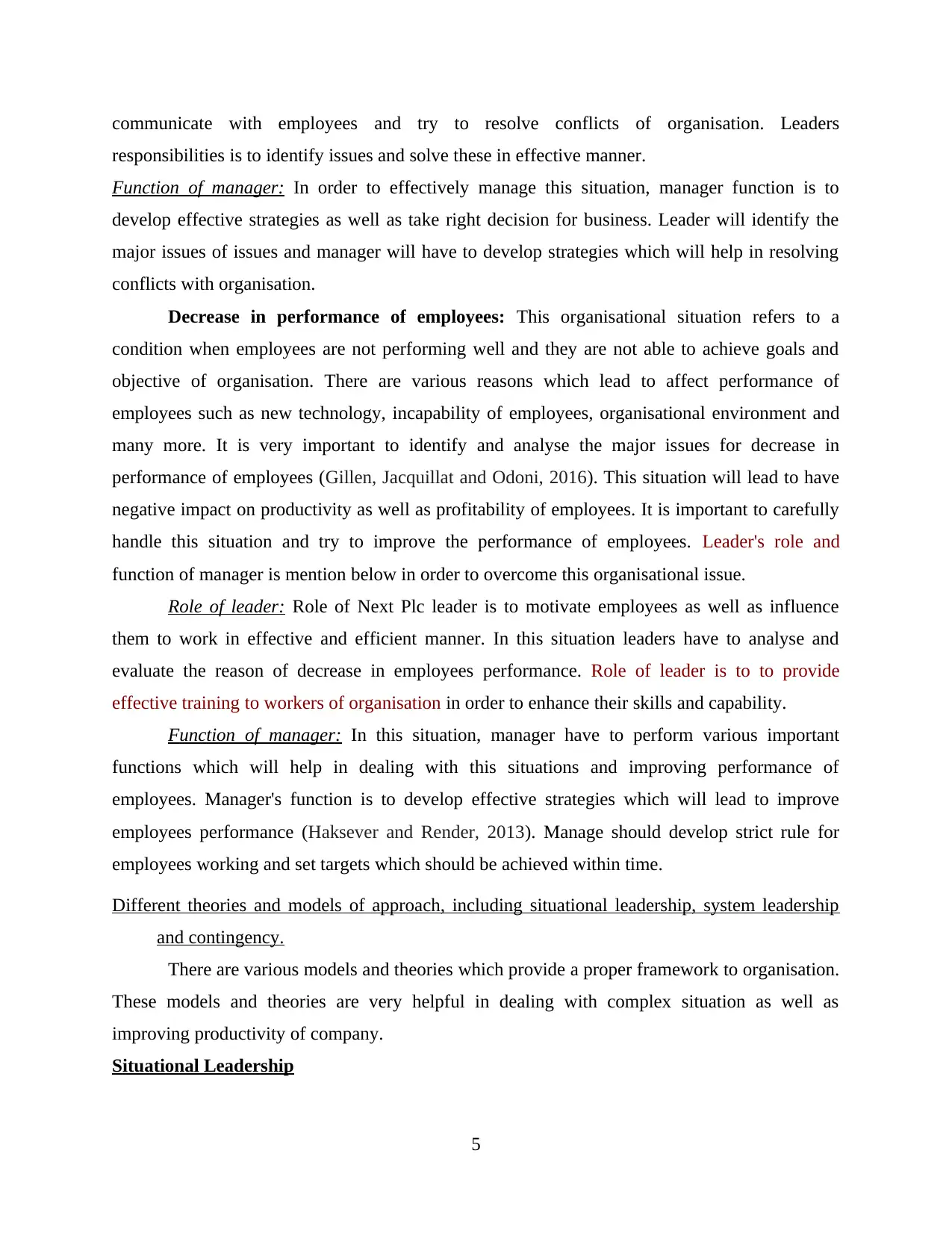
communicate with employees and try to resolve conflicts of organisation. Leaders
responsibilities is to identify issues and solve these in effective manner.
Function of manager: In order to effectively manage this situation, manager function is to
develop effective strategies as well as take right decision for business. Leader will identify the
major issues of issues and manager will have to develop strategies which will help in resolving
conflicts with organisation.
Decrease in performance of employees: This organisational situation refers to a
condition when employees are not performing well and they are not able to achieve goals and
objective of organisation. There are various reasons which lead to affect performance of
employees such as new technology, incapability of employees, organisational environment and
many more. It is very important to identify and analyse the major issues for decrease in
performance of employees (Gillen, Jacquillat and Odoni, 2016). This situation will lead to have
negative impact on productivity as well as profitability of employees. It is important to carefully
handle this situation and try to improve the performance of employees. Leader's role and
function of manager is mention below in order to overcome this organisational issue.
Role of leader: Role of Next Plc leader is to motivate employees as well as influence
them to work in effective and efficient manner. In this situation leaders have to analyse and
evaluate the reason of decrease in employees performance. Role of leader is to to provide
effective training to workers of organisation in order to enhance their skills and capability.
Function of manager: In this situation, manager have to perform various important
functions which will help in dealing with this situations and improving performance of
employees. Manager's function is to develop effective strategies which will lead to improve
employees performance (Haksever and Render, 2013). Manage should develop strict rule for
employees working and set targets which should be achieved within time.
Different theories and models of approach, including situational leadership, system leadership
and contingency.
There are various models and theories which provide a proper framework to organisation.
These models and theories are very helpful in dealing with complex situation as well as
improving productivity of company.
Situational Leadership
5
responsibilities is to identify issues and solve these in effective manner.
Function of manager: In order to effectively manage this situation, manager function is to
develop effective strategies as well as take right decision for business. Leader will identify the
major issues of issues and manager will have to develop strategies which will help in resolving
conflicts with organisation.
Decrease in performance of employees: This organisational situation refers to a
condition when employees are not performing well and they are not able to achieve goals and
objective of organisation. There are various reasons which lead to affect performance of
employees such as new technology, incapability of employees, organisational environment and
many more. It is very important to identify and analyse the major issues for decrease in
performance of employees (Gillen, Jacquillat and Odoni, 2016). This situation will lead to have
negative impact on productivity as well as profitability of employees. It is important to carefully
handle this situation and try to improve the performance of employees. Leader's role and
function of manager is mention below in order to overcome this organisational issue.
Role of leader: Role of Next Plc leader is to motivate employees as well as influence
them to work in effective and efficient manner. In this situation leaders have to analyse and
evaluate the reason of decrease in employees performance. Role of leader is to to provide
effective training to workers of organisation in order to enhance their skills and capability.
Function of manager: In this situation, manager have to perform various important
functions which will help in dealing with this situations and improving performance of
employees. Manager's function is to develop effective strategies which will lead to improve
employees performance (Haksever and Render, 2013). Manage should develop strict rule for
employees working and set targets which should be achieved within time.
Different theories and models of approach, including situational leadership, system leadership
and contingency.
There are various models and theories which provide a proper framework to organisation.
These models and theories are very helpful in dealing with complex situation as well as
improving productivity of company.
Situational Leadership
5
Paraphrase This Document
Need a fresh take? Get an instant paraphrase of this document with our AI Paraphraser
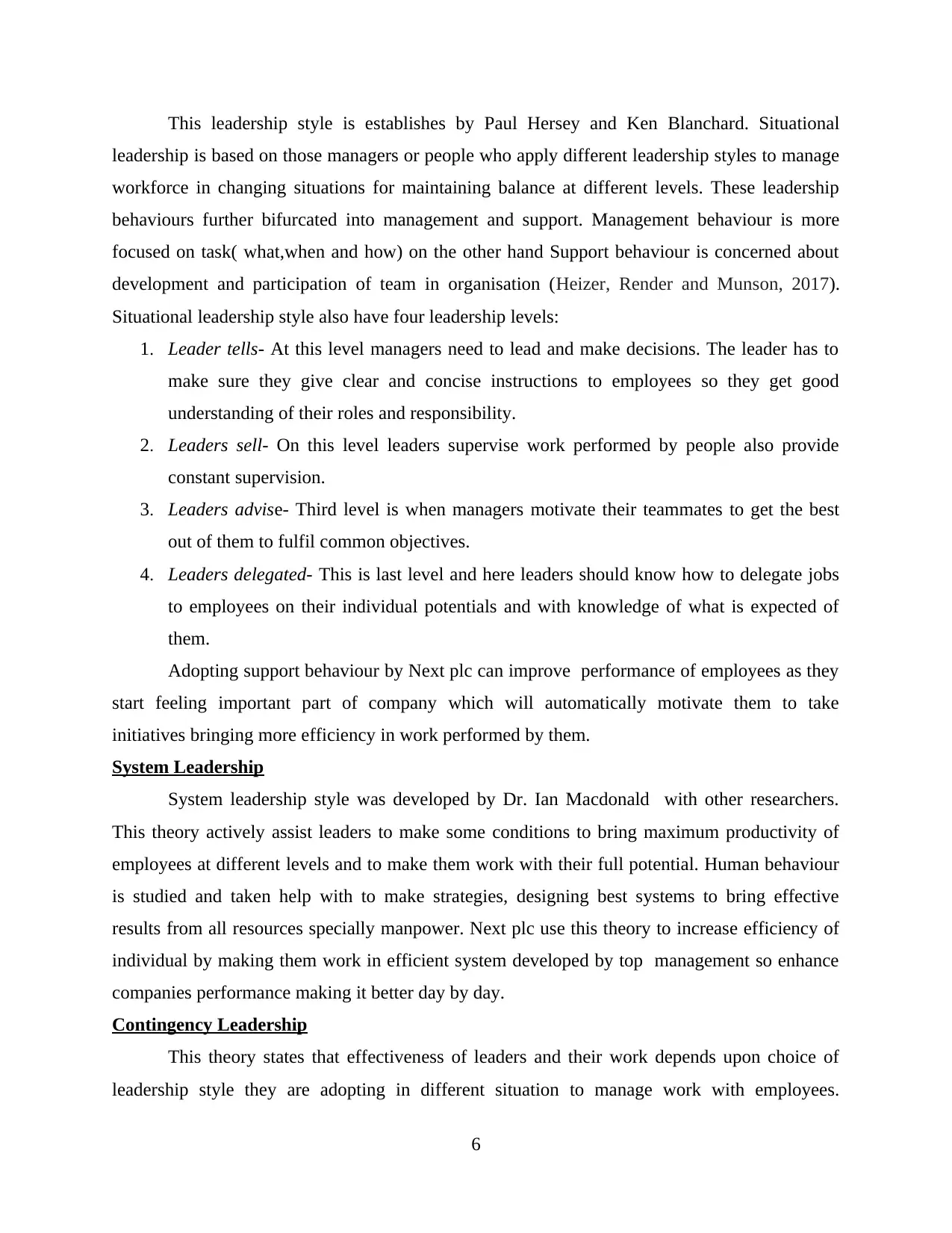
This leadership style is establishes by Paul Hersey and Ken Blanchard. Situational
leadership is based on those managers or people who apply different leadership styles to manage
workforce in changing situations for maintaining balance at different levels. These leadership
behaviours further bifurcated into management and support. Management behaviour is more
focused on task( what,when and how) on the other hand Support behaviour is concerned about
development and participation of team in organisation (Heizer, Render and Munson, 2017).
Situational leadership style also have four leadership levels:
1. Leader tells- At this level managers need to lead and make decisions. The leader has to
make sure they give clear and concise instructions to employees so they get good
understanding of their roles and responsibility.
2. Leaders sell- On this level leaders supervise work performed by people also provide
constant supervision.
3. Leaders advise- Third level is when managers motivate their teammates to get the best
out of them to fulfil common objectives.
4. Leaders delegated- This is last level and here leaders should know how to delegate jobs
to employees on their individual potentials and with knowledge of what is expected of
them.
Adopting support behaviour by Next plc can improve performance of employees as they
start feeling important part of company which will automatically motivate them to take
initiatives bringing more efficiency in work performed by them.
System Leadership
System leadership style was developed by Dr. Ian Macdonald with other researchers.
This theory actively assist leaders to make some conditions to bring maximum productivity of
employees at different levels and to make them work with their full potential. Human behaviour
is studied and taken help with to make strategies, designing best systems to bring effective
results from all resources specially manpower. Next plc use this theory to increase efficiency of
individual by making them work in efficient system developed by top management so enhance
companies performance making it better day by day.
Contingency Leadership
This theory states that effectiveness of leaders and their work depends upon choice of
leadership style they are adopting in different situation to manage work with employees.
6
leadership is based on those managers or people who apply different leadership styles to manage
workforce in changing situations for maintaining balance at different levels. These leadership
behaviours further bifurcated into management and support. Management behaviour is more
focused on task( what,when and how) on the other hand Support behaviour is concerned about
development and participation of team in organisation (Heizer, Render and Munson, 2017).
Situational leadership style also have four leadership levels:
1. Leader tells- At this level managers need to lead and make decisions. The leader has to
make sure they give clear and concise instructions to employees so they get good
understanding of their roles and responsibility.
2. Leaders sell- On this level leaders supervise work performed by people also provide
constant supervision.
3. Leaders advise- Third level is when managers motivate their teammates to get the best
out of them to fulfil common objectives.
4. Leaders delegated- This is last level and here leaders should know how to delegate jobs
to employees on their individual potentials and with knowledge of what is expected of
them.
Adopting support behaviour by Next plc can improve performance of employees as they
start feeling important part of company which will automatically motivate them to take
initiatives bringing more efficiency in work performed by them.
System Leadership
System leadership style was developed by Dr. Ian Macdonald with other researchers.
This theory actively assist leaders to make some conditions to bring maximum productivity of
employees at different levels and to make them work with their full potential. Human behaviour
is studied and taken help with to make strategies, designing best systems to bring effective
results from all resources specially manpower. Next plc use this theory to increase efficiency of
individual by making them work in efficient system developed by top management so enhance
companies performance making it better day by day.
Contingency Leadership
This theory states that effectiveness of leaders and their work depends upon choice of
leadership style they are adopting in different situation to manage work with employees.
6
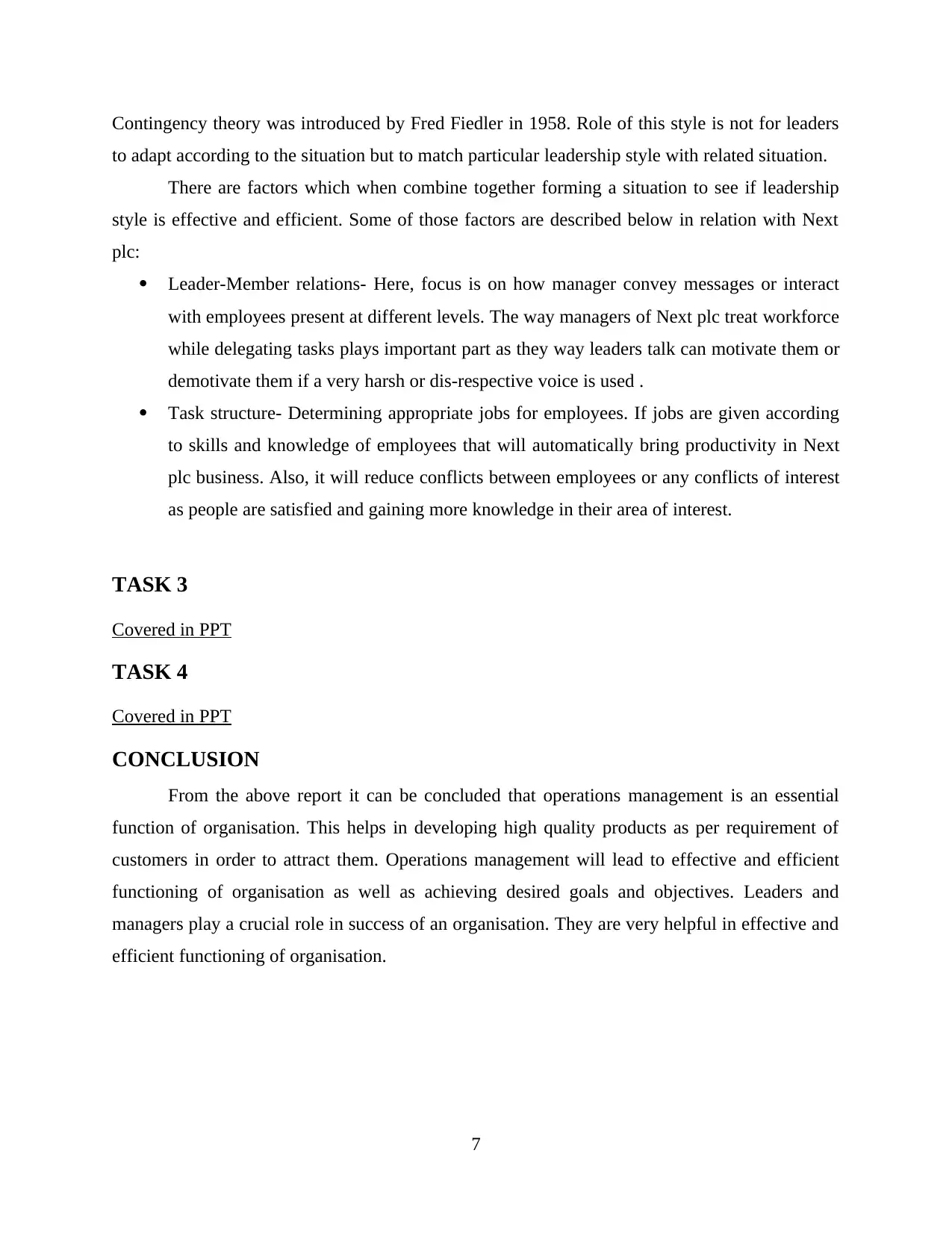
Contingency theory was introduced by Fred Fiedler in 1958. Role of this style is not for leaders
to adapt according to the situation but to match particular leadership style with related situation.
There are factors which when combine together forming a situation to see if leadership
style is effective and efficient. Some of those factors are described below in relation with Next
plc:
Leader-Member relations- Here, focus is on how manager convey messages or interact
with employees present at different levels. The way managers of Next plc treat workforce
while delegating tasks plays important part as they way leaders talk can motivate them or
demotivate them if a very harsh or dis-respective voice is used .
Task structure- Determining appropriate jobs for employees. If jobs are given according
to skills and knowledge of employees that will automatically bring productivity in Next
plc business. Also, it will reduce conflicts between employees or any conflicts of interest
as people are satisfied and gaining more knowledge in their area of interest.
TASK 3
Covered in PPT
TASK 4
Covered in PPT
CONCLUSION
From the above report it can be concluded that operations management is an essential
function of organisation. This helps in developing high quality products as per requirement of
customers in order to attract them. Operations management will lead to effective and efficient
functioning of organisation as well as achieving desired goals and objectives. Leaders and
managers play a crucial role in success of an organisation. They are very helpful in effective and
efficient functioning of organisation.
7
to adapt according to the situation but to match particular leadership style with related situation.
There are factors which when combine together forming a situation to see if leadership
style is effective and efficient. Some of those factors are described below in relation with Next
plc:
Leader-Member relations- Here, focus is on how manager convey messages or interact
with employees present at different levels. The way managers of Next plc treat workforce
while delegating tasks plays important part as they way leaders talk can motivate them or
demotivate them if a very harsh or dis-respective voice is used .
Task structure- Determining appropriate jobs for employees. If jobs are given according
to skills and knowledge of employees that will automatically bring productivity in Next
plc business. Also, it will reduce conflicts between employees or any conflicts of interest
as people are satisfied and gaining more knowledge in their area of interest.
TASK 3
Covered in PPT
TASK 4
Covered in PPT
CONCLUSION
From the above report it can be concluded that operations management is an essential
function of organisation. This helps in developing high quality products as per requirement of
customers in order to attract them. Operations management will lead to effective and efficient
functioning of organisation as well as achieving desired goals and objectives. Leaders and
managers play a crucial role in success of an organisation. They are very helpful in effective and
efficient functioning of organisation.
7
⊘ This is a preview!⊘
Do you want full access?
Subscribe today to unlock all pages.

Trusted by 1+ million students worldwide
1 out of 10
Related Documents
Your All-in-One AI-Powered Toolkit for Academic Success.
+13062052269
info@desklib.com
Available 24*7 on WhatsApp / Email
![[object Object]](/_next/static/media/star-bottom.7253800d.svg)
Unlock your academic potential
Copyright © 2020–2026 A2Z Services. All Rights Reserved. Developed and managed by ZUCOL.





